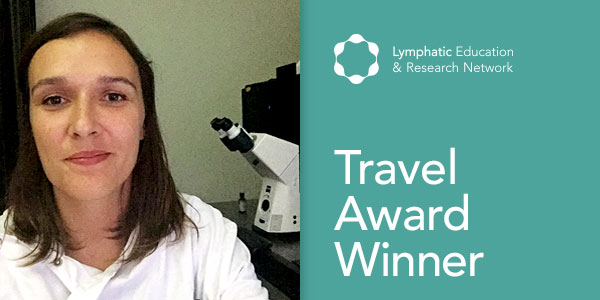Cathy Pichol-Thievend, currently a postdoc at the University of Queensland, Australia, under the supervision of Dr. Mat Francois received a travel award from LE&RN to attend the 2016 Gordon Research Conference in Lymphatics held in Ventura, CA. We asked Cathy to share her thoughts on that experience with us and to tell us a bit about his research and future plans.
What did you get out of the Conference? Why did you feel it was important to attend?
The 2016 Gordon Research Conference in Lymphatics was the first Gordon Research Conference I attended. The format of the meeting (limited-participation, free-form discussion) allows a direct interaction with top scientists in the field. This was a really unique opportunity to present my findings to the lymphatic community and it was really beneficial as I gained valuable feedback. It was an extraordinary and truly inspiring experience, which has definitely enhanced my knowledge of the lymphatic field.
What are your areas of interest in research?
I completed my PhD at the CIRB/College de France, in Paris, in 2012. During my PhD I studied the role of extracellular matrix components in developmental angiogenesis using both cell culture and the zebrafish model. In 2013, I moved to Australia where I joined the Francois lab to gain more expertise in the field of cardiovascular development.
The main focus of my post-doctoral research is to decipher the cellular origin of lymphatics during embryonic development and to dissect the cellular processes critical to establishing lymphatic vessel identity. I am currently building genetic tools in both mouse and zebrafish model systems in order to investigate in vivo key cellular and molecular mechanisms of lymphangiogenesis.
What are your hopes and plans for your career and your research?
I would like to continue my Postdoc in Mat Francois’s lab. Our group is part of the UQ Centre for Cardiac and Vascular Biology (CCVB), an incredibly stimulating and creative environment, that brings together researchers from The University of Queensland with a common goal, to investigate vertebrate cardiac and vascular biology with a focus on development, regeneration and disease. I hope that my research will contribute to a better understanding on how lymphatic specified during embryonic development.
Why do you believe that, in general, lymphatic research is important? What might the field accomplish within the next few years?
Lymphatic research is essential to identify new potential treatment for patients suffering from lymphatic-related diseases. I believe that the discovery about the genes, molecules, and cellular processes that control lymphatic vessel formation will generate new directions in the hunt for future therapeutics.
